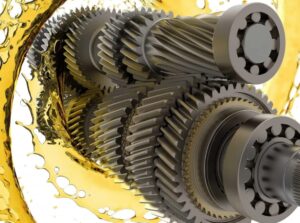Reduce Maintenance with Synthetic Hydraulic Oil
Synthetic hydraulic oil is designed to provide superior performance compared to traditional petroleum-based oils. Its chemical structure offers better viscosity stability, thermal stability, and oxidation resistance. This translates to fewer breakdowns, reduced maintenance costs, and extended equipment life. Synthetic oils operate efficiently in extreme temperatures and conditions, reducing the frequency of oil changes and the volume of oil required. They are particularly beneficial in systems subjected to high pressures, severe temperatures, and environments where contamination risk is high.
What Is Hydraulic Oil?
Hydraulic oil is a fluid used for power transmission in hydraulic systems, enabling machinery to operate smoothly. It functions as a power transfer medium, lubricant, and coolant. Hydraulic oils are formulated to handle the pressures exerted by machinery while protecting components from wear and corrosion. They must maintain their properties over a range of temperatures and conditions. Quality hydraulic oil is critical for the reliability, performance, and lifespan of hydraulic systems.
Types of Hydraulic Oil Contamination
Hydraulic oil contamination can occur from various sources such as particulate matter, water ingress, air, and chemical degradation. Particulate contamination can be from external sources or from wear within the system. Water contamination reduces oil viscosity, leading to increased wear and corrosion. Air contamination can cause oxidation and cavitation, leading to system inefficiency. Regular monitoring and maintaining cleanliness standards are crucial to prevent these contaminations and ensure system integrity.
Applications of Hydraulic Oil
Hydraulic oil finds applications across various industries including construction, manufacturing, mining, and agriculture. It is used in equipment such as excavators, hydraulic presses, power steering systems, and brakes. The role of hydraulic oil in these applications is to transmit power, lubricate parts, and protect against wear and corrosion, ensuring smooth operation and extending the lifespan of machinery.
How to Choose the Right Hydraulic Oil

Choosing the right hydraulic oil involves considering factors like the type of hydraulic system, operating environment, load, speed, and temperature. Understanding the specifications required by the equipment manufacturer and the unique conditions of your application is crucial. Additionally, factors such as oil life, filtration needs, and compatibility with system materials should also be considered.
Water-Based Hydraulic Oil
Water-based hydraulic oils, also known as water-glycol solutions, are used where fire resistance is crucial. These oils are a mixture of water and glycol, where water provides the fire-resistant property and glycol provides the lubrication. They are typically used in high-temperature, high-risk environments but offer lower lubrication compared to oil-based hydraulic fluids.
Synthetic Hydraulic Oil
As previously discussed, synthetic hydraulic oil offers superior properties in terms of performance, temperature range, and stability. These oils are engineered to provide excellent lubrication, reduced wear, and longer life spans for hydraulic systems. They are ideal for challenging environments and demanding applications.
Petroleum-Based Hydraulic Oil
Petroleum-based hydraulic oils are made from refined crude oil with various additives to enhance properties like oxidation resistance, wear protection, and viscosity stability. They are widely used due to their cost-effectiveness and availability but may require more frequent changes and maintenance compared to synthetic oils.
What Are Some Uses for Hydraulic Oil?
Beyond machinery, hydraulic oil is used in various tools and systems where precise power transmission is required. These include car lifts, airplane controls, and industrial machinery. It provides a means to transfer force within hydraulic systems, ensuring efficient and smooth operation. The versatility of hydraulic oil makes it indispensable in both heavy industry and everyday machinery.
Why You Need to Understand the Flash Points of Hydraulic Oil
Understanding the flash points of hydraulic oil is crucial for safety and efficiency. The flash point is the temperature at which the oil emits enough vapor to ignite in air. Knowing this property helps in assessing the risk of fire and choosing the correct oil for specific operating environments. Oils with higher flash points are generally safer and can perform better at higher temperatures.
Why Oil Viscosity and Operating Temperatures Matter
Oil viscosity is a critical factor in the performance of hydraulic systems. It affects the system’s efficiency and wear rates. The right viscosity ensures that the hydraulic oil forms a sufficient lubricating film to prevent direct metal-to-metal contact. Operating temperatures affect oil viscosity; therefore, choosing an oil with the correct viscosity grade for specific operating temperatures is vital for system efficiency and component longevity.
When Should You Replace Hydraulic Oil?
Replacing hydraulic oil should be based on the operating conditions, oil analysis results, and manufacturer recommendations. Factors such as oil age, contamination levels, and changes in physical or chemical properties can indicate when a change is necessary. Regular monitoring and maintenance are crucial to ensure the longevity and efficiency of hydraulic systems.
Final Thoughts
Hydraulic oils are essential for the smooth and efficient operation of hydraulic systems across various industries. Understanding the different types of hydraulic oils and their applications helps in optimizing system performance and longevity. Regular maintenance and appropriate selection of hydraulic oil according to specific requirements are key to reducing downtime and maintenance costs.
FAQs

Radiator Stop Leak UAE: Quick Fix for Vehicle Cooling System Leaks
Radiator Stop Leak UAE: Quick Fix for Vehicle Cooling System Leaks Discover More Introduction: The Unforgiving UAE Climate and Your Vehicle’s Lifeline The United Arab Emirates’ automotive landscape is defined by extremes. Ambient temperatures that regularly surpass 45°C (113°F), coupled with intense urban congestion and long, high-speed desert drives, create a perfect storm of thermal stress for every vehicle. In this environment, your engine cooling system is not merely a subsystem; it is the single most critical component preventing catastrophic engine failure.

What Type of Transmission Oil in UAE Does My Car Need? Your Complete Guide
What Type of Transmission Oil in UAE Does My Car Need? Your Complete Guide Discover More Navigating the vast, sun-baked highways of the United Arab Emirates—from the dynamic urban sprawls of Dubai and Abu Dhabi to the majestic desert dunes and the tranquil mountain passes of the Hajar range—places extraordinary mechanical and thermal stress on every component of your vehicle. While conscientious drivers often prioritize engine oil changes, the vital lifeblood safeguarding the transmission, the complex heart of your car’s

Guide to UAE Turbine Oil Selection Application & Management for Industrial Facilities
Guide to UAE Turbine Oil Selection, Application, and Management for Industrial Facilities Discover More In the hyper-competitive industrial landscape of the United Arab Emirates, where operational excellence directly translates to economic advantage, turbine lubrication represents a critical nexus of reliability engineering and strategic asset management. This comprehensive guide, developed with technical insights from Rumanza Lubricants, provides an unprecedented deep dive into the science, selection criteria, and life-cycle management of turbine oils specifically engineered for the extreme operating conditions of the

Synthetic vs. Mineral Hydraulic Oil in UAE : Which is Best for Your Operation?
Synthetic vs. Mineral Hydraulic Oil in UAE : Which is Best for Your Operation? Discover More Across the dynamic landscape of the United Arab Emirates—from the megaprojects of Dubai Marina to the intricate conveyor systems of Jebel Ali Port, from the massive hydraulic shovels in Al Dhafra quarries to the precision automated lines in Abu Dhabi’s industrial cities—the silent, powerful force of hydraulics is indispensable. These systems convert fluid power into monumental force and precise motion. At the core of

What is a Pour Point Depressant? | Benefits, Uses & How It Works Mechanism
What is a Pour Point Depressant? | Benefits, Uses & How It Works Mechanism Discover More In the intricate world of lubricant formulation, few additives play as critical yet understated a role in cold-weather operability as Pour Point Depressants (PPDs). These specialized chemical compounds are the linchpin that prevents machinery from seizing up when temperatures plummet. This in-depth guide goes beyond the basics, exploring the sophisticated chemistry, detailed mechanism, nuanced benefits, and practical considerations of PPDs. We will also examine the

Guide to Gasoline Engine Oils for UAE’s Extreme Climate: Engineering Peak Performance
Gasoline Engine Oils for UAE’s Extreme Climate: Engineering Peak Performance Discover More In the heart of the Arabian Peninsula, the United Arab Emirates stands as a testament to human ambition, with its engineering marvels and endless highways. Yet, this environment of soaring achievement is also one of the most punishing on Earth for machinery. For your vehicle—whether a nimble city sedan, a powerful family SUV, or a high-performance sports car—the UAE’s climate is a relentless adversary. The choice of engine

What are Polyol Ester Oils & Lubricants – Properties & Applications
What are Polyol Ester Oils & Lubricants – Properties & Applications Discover More In the intricate world of industrial machinery, automotive engines, and advanced refrigeration systems, the choice of lubricant is not merely a maintenance task—it’s a critical engineering decision. While conventional mineral oils have served us for over a century, the demands of modern technology require fluids that can perform under extreme pressure, temperature, and environmental stress. This is where synthetic lubricants, specifically Polyol Ester oils, come to the forefront.